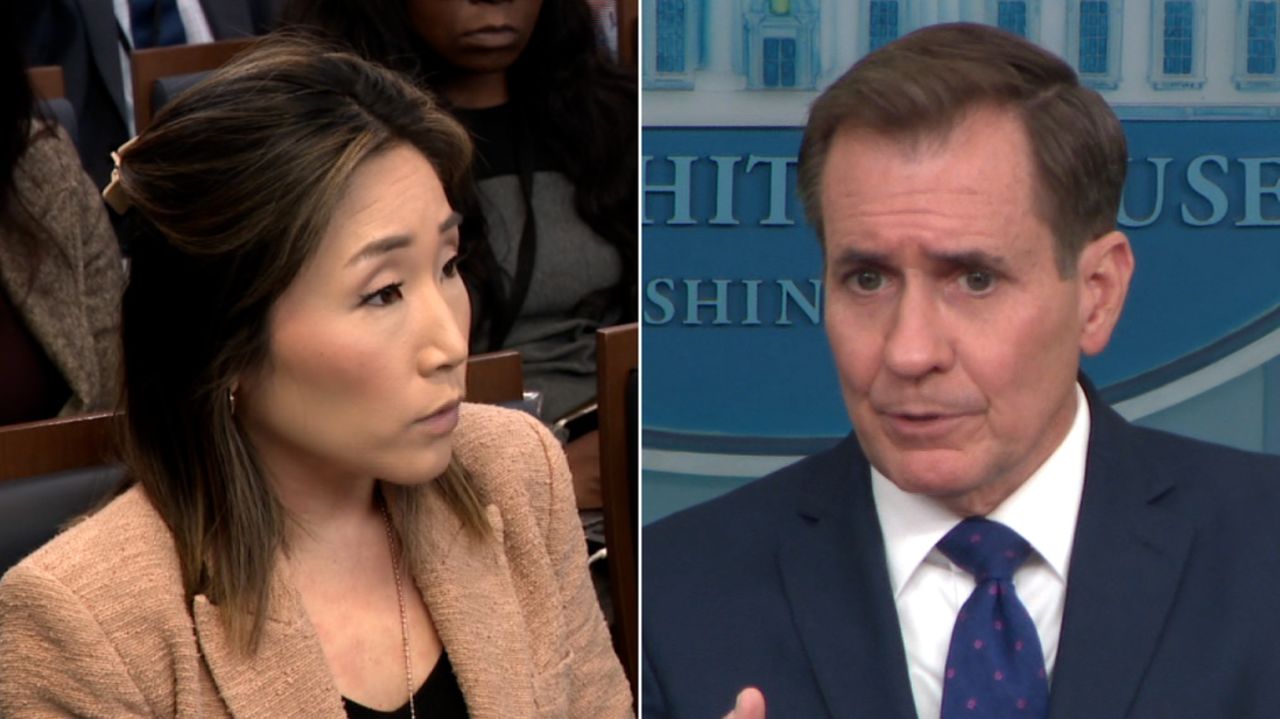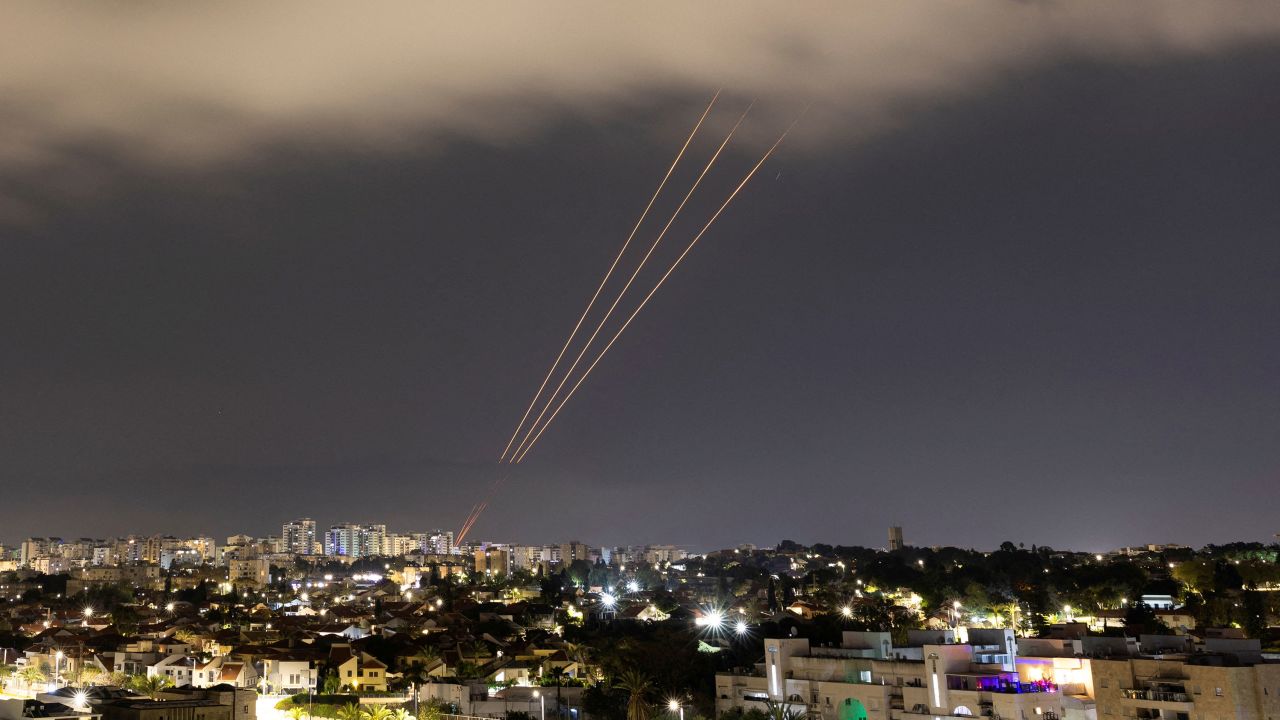The wave of drones and missiles that flew towards Israel overnight on Sunday brought with it a new phase of tension, uncertainty and confrontation in the Middle East.
Iran launched the unprecedented attack in response to a suspected Israeli strike on the Iranian consulate in Damascus, Syria, earlier this month.
It marked a new chapter in a discord between the two states that percolated for years and has spiralled since Israel declared war on Hamas last October.
The next steps remain unclear, but Israel is facing pleas from its allies to step back from the brink of open warfare and choose a path of de-escalation.
Here’s what you need to know.
How did Iran attack Israel?
More than 300 projectiles – including around 170 drones and over 120 ballistic missiles – were fired toward Israel in the immense aerial attack overnight. Approximately 350 rockets were fired from Iran, Iraq, Yemen, and Lebanon’s Hezbollah, according to Israel Defense Forces (IDF) spokesperson Daniel Hagari.
However, “99%” of the projectiles were intercepted by Israel’s aerial defense systems and its allies, according to the Israeli military, with only a small number reaching Israeli territory.
Tehran’s attack targeted the Nevatim airbase, an Iranian army official said on Sunday, alleging that this is where Israel’s?early April strike on the Iranian consulate was launched from.
Iranian ballistic missiles that reached Israel fell on the airbase in the south of the country and caused only light structural damage, Hagari said. The base is functioning and continuing its operations following the attack, with planes continuing to use the base, Hagari added.
A senior US military official told reporters Sunday that the US assessed “there’s no significant damage within Israel itself.”
US ships in the eastern Mediterranean Sea destroyed between four and six Iranian ballistic missiles during the attack and aircraft in the region shot down more than 70 Iranian one-way UAVs headed toward Israel. The US Army Patriot missile battery shot down one ballistic missile in the vicinity of Erbil, Iraq, the official said.
Why did the attack take place?
Israel and Iran are long-standing rivals and have been engaged in a shadow war for years.
Israel’s war on Hamas, waged since the militant group attacked Israel on October 7, has heightened those tensions.
Iranian-backed forces in Iraq and Syria have launched attacks aimed at US military positions in those countries and Iran’s leadership has warned that attacks by its allies won’t stop until Israel’s war in Gaza ends.
But fears of a spiralling regional war spiked further in early April, when Iran accused Israel of?bombing its diplomatic complex?in Syria.
That airstrike destroyed the consulate building in the capital Damascus, killing at least seven officials including Mohammed Reza Zahedi, a top commander in Iran’s elite Revolutionary Guards (IRGC),?and senior commander Mohammad Hadi Haji Rahimi, Iran’s?foreign ministry?said at the time.
Zahedi, a former commander of the IRGC’s ground forces, air force, and the deputy commander of its operations, was the most high-profile Iranian target killed since then-US President Donald Trump ordered the assassination of IRGC Gen. Qassem Soleimani in Baghdad in 2020.
Iran Supreme Leader Ayatollah Ali Khamenei said Israel would be punished for the attack, while President Ebrahim Raisi said it?would?“not go unanswered,” state news agency IRNA reported. The Iran-backed Lebanese militant group Hezbollah said the strike would be met with “punishment and revenge.”
The region has been on edge ever since, with the US and Israel warning of intelligence that an Iranian attack was imminent.
How have Israel and its allies responded to the Iranian strike?
Israel reacted angrily to the unprecedented strikes, while praising its military’s response.
But Israel’s allies in the West urged the country to work to de-escalate the crisis, rather than respond in a way which could tip the situation into open warfare.
US President Joe Biden spoke by phone with Israeli Prime Minister Netanyahu, and made clear that the US would not participate in any offensive operations against Iran, a senior White House administration official told CNN.
Biden told Netanyahu he should consider the events of Saturday night a “win” as Iran’s attacks had been largely unsuccessful, and instead?demonstrated?Israel’s “remarkable capacity to defend against and defeat even unprecedented attacks.”
After a virtual meeting Sunday, leaders of the G7 condemned in a joint statement the Iranian attack, which it said “risks provoking an uncontrollable regional escalation.”
“We demand that Iran and its proxies cease their attacks, and we stand ready to take further measures now and in response to further destabilizing initiatives,” they said.

What happens next?
The decisions made by Israel’s War Cabinet will dictate the immediate next steps.
The three-man group met Sunday and then again on Monday, and the attacks sparked a heated debate over how to respond, two Israeli sources told CNN.
On Monday, the war cabinet reviewed military plans for a potential response during a nearly three-hour meeting, an Israeli official said.
The war cabinet remains determined to respond to Iran’s attack, but it is not clear at this point if a decision has been made on what that response will be. However, there is a sense that Israel must act quickly, the official said.
The IDF chief of staff Lt. Gen. Herzi?Halevi said later on Monday that Iran’s attack “will be met with a response,” while IDF spokesman Daniel Hagari said the force will do “all that is necessary” to defend Israel and “will do that at the time we choose.”
In addition to a potential military response, the war cabinet is also?mulling diplomatic options?to further isolate Iran on the world stage.
One of the members, Benny Gantz said Israel will “exact a price from Iran in a way and time that suits us.”
Israeli government hardliners have called for firm action. Finance Minister Bezalel Smotrich urged a response that “resonates throughout the Middle East,” and National Security Minister Itamar Ben Gvir said Israel should “go crazy.”
Israel told the United States that it’s not “looking for a significant escalation with Iran,” a senior Biden administration told reporters Sunday.
“They’re looking to protect themselves and defend themselves,” the official said.
On Sunday, Iran said a “new equation” in its adversarial relationship with Israel had been opened, and warned of a “much bigger” assault on the country should Netanyahu decide on a tit-for-tat attack.
“We have decided to create a new equation, which is that if from now on the Zionist regime attacks our interests, assets, personalities, and citizens, anywhere, and at any point, we will retaliate against them,” the Commander of the Islamic Revolutionary Guard Corps (IRGC) Hossein Salami told Iranian state TV. The “Zionist regime” is a term Iran uses to refer to Israel.
CNN’s Zeena Saifi, Lauren Izso, Adam Pourahmadi, Alireza Hajihosseini, Abdul Nasir, and Eyad Kourdi, Tamar Michaelis, Jeremy Diamond,?Hamdi Alkhshali and?Nectar Gan contributed reporting

